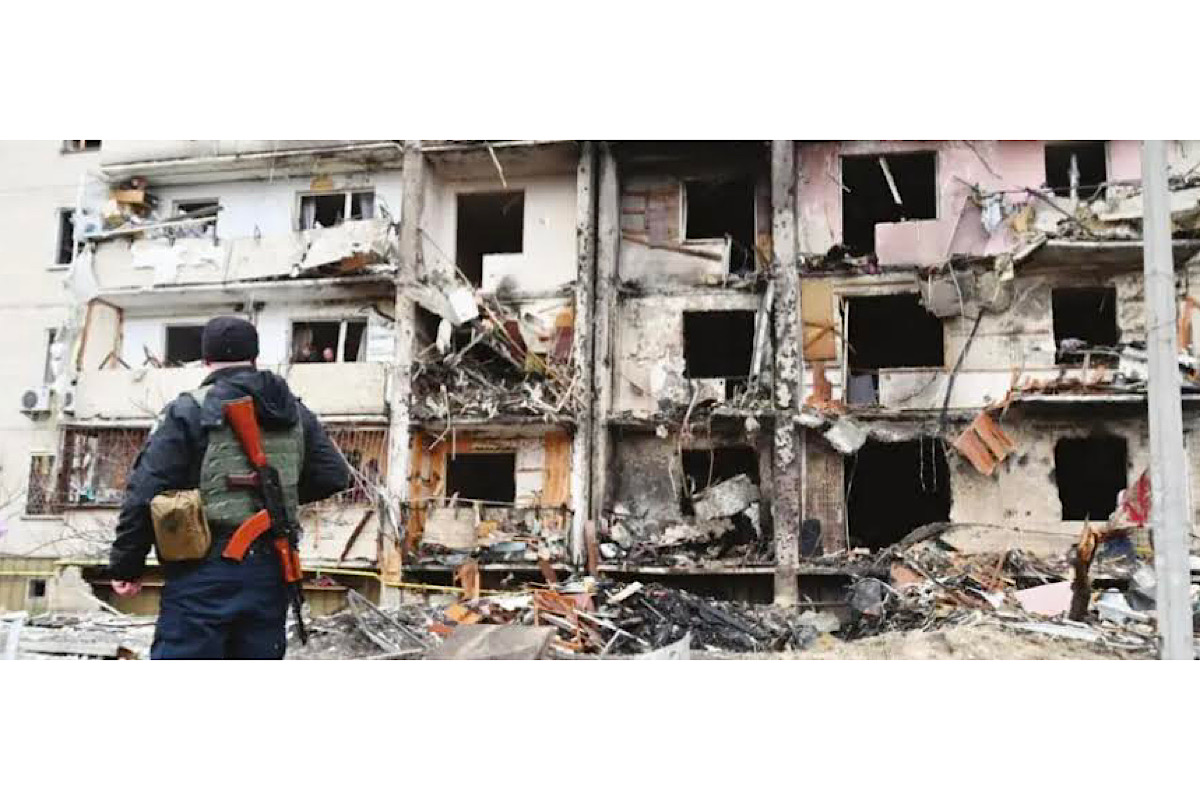Putin plays with f ire in his new doctrine
Of late Vladimir Putin has shifted Russia’s nuclear doctrine to a more directly and openly retaliatory posture in response to any attack by Ukraine or any NATO country using longer-range US missiles.
The war has resulted in high inflation, higher energy prices, less money with households and higher interest rates. The IMF director general feels that 2023 would be economically far worse.

Ukraine has fought the Russians to a standstill. The continued fighting in Donbas has led to very heavy casualties on both sides. [Photo:SNS]
After a year of fighting in Ukraine who has gained from it? Europe, Russia or Ukraine? Taking first Russia, once a world power at par with the USA and China, what is its state now? While its blocked foreign reserves remain high, the economy has suffered and will continue to do so notwithstanding the alternative markets it has been able to create for its oil, gas, fertilisers, grain and other commodities. No doubt it retains nuclear and missile capabilities. Its military capability has been badly degraded to the extent that Chechnya and other republics could feel free to defy Moscow without fear of military retaliation. Ramzan Kadyrov’s attitude says it all.
Central Asian Republics are already looking at alternatives. In sum, Russia is no longer a world power. Mr. Vladimir Putin’s hold over Russia’s sixteen time zones stretching to Vladivastok in the East could start weakening. The principal beneficiary on several counts is China. The West should be worried about this development as should India.
Taking NATO and the European Union as a whole, the situation does not seem too rosy. The initial welcome to the influx of eight million Ukrainians is wearing thin. The prospects of their going back seem remote. The new arrivals having found jobs will be reluctant to return to a devastated country, should a ceasefire followed by termination of hostilities take place. After cessation of Russian gas supplies, the winter though milder has been harsh for the majority of people other than in Germany. Britain has been hardest hit with no end in sight for the misery of the people, although it is not dependent on Russian gas.
Advertisement
The war has resulted in high inflation, higher energy prices, less money with households and higher interest rates. The IMF director general feels that 2023 would be economically far worse.
A major negative for climate change was Germany returning to coal as well as reopening nuclear plants and others planning new nuclear plants.
Moving on to Ukraine. The country has fought the Russians to a standstill. The continued fighting in Donbas has led to very heavy casualties on both sides. Both countries are running short of munitions to continue the war and are dependent on other countries to replenish their stocks.
Whenever the war ends, whichever way it ends Ukraine has become a devastated country. It’s economy is shattered. It will require Western aid to rebuild the country at a cost far higher than the cost of fighting material supplied to it from Europe and the US. Rebuilding it could take up to 25 years if the funds required, possibly anywhere up to $500 billion, keep coming at the rate that war resources were supplied to it. That seems unlikely because Europe other than Germany will be unable to do so.
How will the war end? Ukraine has become a Chakravyuh for Europe. Easy to get in, hard to get out. In the Mahabharata the hero Arjun’s son Abhimanyu perished not having the knowledge of how to exit. Europe more than Ukraine faces a similar dilemma. The war is becoming unsustainable for Europe. The rate at which Ukraine is expending munitions will soon become beyond Europe’s ability to resupply as the US cannot sustain supplying these on its own.
Most European countries will soon end up, if not already the case, exhausting their own war reserves. These too will have to be made up. The tragedy for Europe from the Atlantic to the Urals as well as for the world is that these monies are required for meeting climate change goals besides investing in technologies of the future.
Russia is essentially a European country having been a bulwark against the Mongol hordes and other invaders from the East. Weakening it further can never be in Europe’s interest.
The war has to end. Not sooner the better, but almost forthwith. For this leaders of the major European powers, Germany, France and UK (the latter two permanent members of the UN Security Council) must directly negotiate with Mr. Putin, over Volodymyr Zelenskyy’s head if necessary, for an early negotiated settlement acceptable to Russia and Europe. Ukraine will be obliged to go along.
This is essentially a European War. The Russian President will have to go along as well. Time remains of the essence.
(The writer, a retired Major-General of the Indian Army, analyses international relations.)
Advertisement